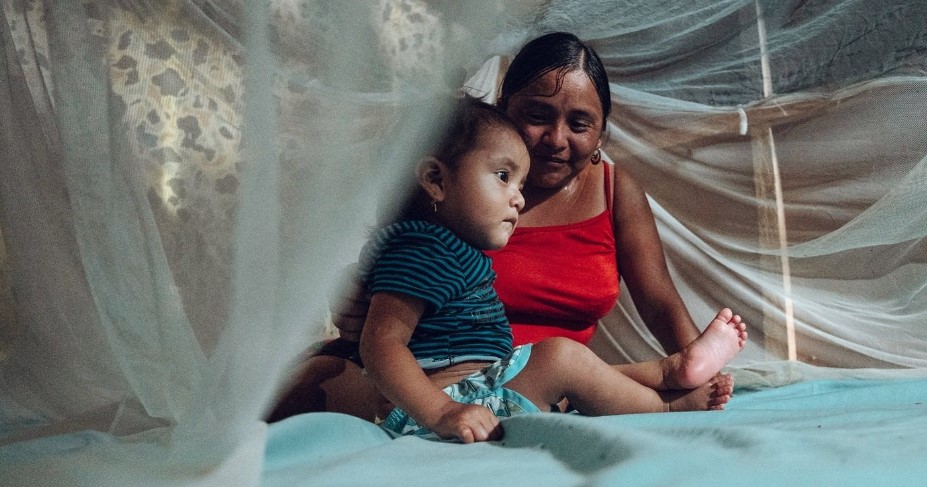Malaria is a life-threatening disease spread to humans by some types of mosquitoes. It is mostly found in tropical countries. It is preventable and curable.
The infection is caused by a parasite and does not spread from person to person.
Symptoms can be mild or life-threatening. Mild symptoms are fever, chills and headache. Severe symptoms include fatigue, confusion, seizures, and difficulty breathing.
Infants, children under 5 years, pregnant women, travellers and people with HIV or AIDS are at higher risk of severe infection.
Malaria can be prevented by avoiding mosquito bites and with medicines. Treatments can stop mild cases from getting worse.
Malaria mostly spreads to people through the bites of some infected female Anopheles mosquitoes.
Blood transfusion and contaminated needles may also transmit malaria.
The first symptoms may be mild, similar to many febrile illnesses, and difficulty to recognize as malaria. Left untreated, P. falciparum malaria can progress to severe illness and death within 24 hours.
There are 5 Plasmodium parasite species that cause malaria in humans and 2 of these species – P. falciparum and P. vivax – pose the greatest threat. P. falciparum is the deadliest malaria parasite and the most prevalent on the African continent. P. vivax is the dominant malaria parasite in most countries outside of sub-Saharan Africa.
The other malaria species which can infect humans are P. malariae, P. ovale and P. knowlesi.
Key facts
Globally in 2022, there were an estimated 249 million malaria cases and 608 000 malaria deaths in 85 countries.
The WHO African Region carries a disproportionately high share of the global malaria burden.
In 2022, the Region was home to 94% of malaria cases (233 million) and 95% (580 000) of malaria deaths.
Children under 5 accounted for about 80% of all malaria deaths in the Region.
Symptoms
The most common early symptoms of malaria are fever, headache and chills.
Symptoms usually start within 10–15 days of getting bitten by an infected mosquito.
Symptoms may be mild for some people, especially for those who have had a malaria infection before. Because some malaria symptoms are not specific, getting tested early is important.
Some types of malaria can cause severe illness and death. Infants, children under 5 years, pregnant women, travellers and people with HIV or AIDS are at higher risk. Severe symptoms include:
- extreme tiredness and fatigue
- impaired consciousness
- multiple convulsions
- difficulty breathing
- dark or bloody urine
- jaundice (yellowing of the eyes and skin)
- abnormal bleeding.
People with severe symptoms should get emergency care right away. Getting treatment early for mild malaria can stop the infection from becoming severe.
Malaria infection during pregnancy can also cause premature delivery or delivery of a baby with low birth weight.
Disease burden
According to the latest World malaria report, there were 249 million cases of malaria in 2022 compared to 244 million cases in 2021. The estimated number of malaria deaths stood at 608 000 in 2022 compared to 610 000 in 2021.
The WHO African Region continues to carry a disproportionately high share of the global malaria burden. In 2022 the Region was home to about 94% of all malaria cases and 95% of deaths. Children under 5 years of age accounted for about 78% of all malaria deaths in the Region.
Four African countries accounted for just over half of all malaria deaths worldwide: Nigeria (26.8%), the Democratic Republic of the Congo (12.3%), Uganda (5.1%) and Mozambique (4.2%).
Prevention
Malaria can be prevented by avoiding mosquito bites and by taking medicines. Talk to a doctor about taking medicines such as chemoprophylaxis before travelling to areas where malaria is common.
Lower the risk of getting malaria by avoiding mosquito bites:
- Use mosquito nets when sleeping in places where malaria is present
- Use mosquito repellents (containing DEET, IR3535 or Icaridin) after dusk
- Use coils and vaporizers.
- Wear protective clothing.
- Use window screens.
Vector control
Vector control is a vital component of malaria control and elimination strategies as it is highly effective in preventing infection and reducing disease transmission.
The 2 core interventions are insecticide-treated nets (ITNs) and indoor residual spraying (IRS).
Progress in global malaria control is threatened by emerging resistance to insecticides among Anopheles mosquitoes. As described in the latest World malaria report, other threats to ITNs include insufficient access, loss of nets due to the stresses of day-to-day life outpacing replacement, and changing behaviour of mosquitoes, which appear to be biting early before people go to bed and resting outdoors, thereby evading exposure to insecticides.
Vaccine
Since October 2021, WHO has recommended broad use of the RTS,S/AS01 malaria vaccine among children living in regions with moderate to high P. falciparum malaria transmission.
The vaccine has been shown to significantly reduce malaria, and deadly severe malaria, among young children.
In October 2023, WHO recommended a second safe and effective malaria vaccine, R21/Matrix-M. The availability of two malaria vaccines is expected to make broad-scale deployment across Africa possible.
Treatment
Early diagnosis and treatment of malaria reduces disease, prevents deaths and contributes to reducing transmission. WHO recommends that all suspected cases of malaria be confirmed using parasite-based diagnostic testing (through either microscopy or a rapid diagnostic test).
Malaria is a serious infection and always requires treatment with medicine.
Multiple medicines are used to prevent and treat malaria. Doctors will choose one or more based on:
- the type of malaria
- whether a malaria parasite is resistant to a medicine
- the weight or age of the person infected with malaria
- whether the person is pregnant.
These are the most common medicines for malaria:
- Artemisinin-based combination therapy medicines are the most effective treatment for P. falciparum malaria.
- Chloroquine is recommended for treatment of infection with the P. vivax parasite only in places where it is still sensitive to this medicine.
- Primaquine should be added to the main treatment to prevent relapses of infection with the P. vivax and P. ovale parasites.
- Most medicines used are in pill form. Some people may need to go to a health centre or hospital for injectable medicines.
Elimination
Malaria elimination is defined as the interruption of local transmission of a specified malaria parasite species in a defined geographical area as a result of deliberate activities.
Continued measures to prevent re-establishment of transmission are required.
In 2022, 34 countries reported fewer than 1000 indigenous cases of the disease, up from just 13 countries in 2000.
Countries that have achieved at least 3 consecutive years of zero indigenous cases of malaria are eligible to apply for the WHO certification of malaria elimination.
Since 2015, 12 countries have been certified by the WHO Director-General as malaria-free, including Maldives (2015), Sri Lanka (2016), Kyrgyzstan (2016), Paraguay (2018), Uzbekistan (2018), Argentina (2019), Algeria (2019), China (2021), El Salvador (2021), Azerbaijan (2023), Tajikistan (2023) and Belize (2023).









Comment